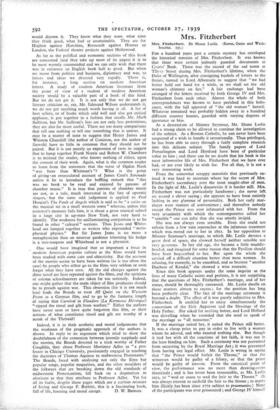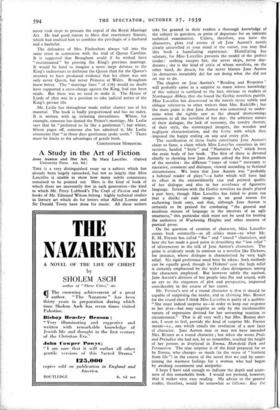Mrs. Fitzherbert
FOR a hundred years past a certain mystery has enveloped the historical remains of Mrs. Fitzherbert. It was known that there were certain jealously guarded documents at Coutts' Bank. There was the record of the sad scene at Tilns7 Street during Mrs. Fitzherbert's lifetime, when the Duke of Wellington, after consigning bushels of letters to the flames, turned to Lord Albemarle to suggest that " we had better hold our hand for a while, or we shall set the old woman's chimney on fire." A fair exchange had been arranged of the letters received by both George IV and Mrs.
Fitzherbert from each other. Almost the whole of both correspondences was known to have perished in this holo- caust, with the full approval of " the old woman " herself. Whatever remained was probably' hidden away in a hundred different country houses, guarded with varying degrees of ignorance or bias.
As a descendant of Minney Seymour, Mr. Shane Leslie had a strong claim to be allowed to continue the investigation of the subject. As a Roman Catholic, he can never have been suspected of a wish to handle it sensationally. Thus privileged, he has been able to carry through a fairly complete research into this delicate subject. The family papers of Lord Portarlington and Lord Hertford have been of particular value to him ; and there can be no doubt that his book is the most informative life of Mrs. Fitzherbert that we have ever had, or are ever likely to wish for. For all that, it is not a very interesting work.
From the somewhat scrappy materials that previously ex- isted it was hard to ascertain where lay the secret of Mrs.
Fitzherbert's ascendancy over the most sought-after of men.
In the light of Mr. Leslie's discoveries it is harder still. Mrs. Fitzherbert was not particularly handsome ; she never left on record a clever saying ; she appears to have been entirely lacking in any glamour of personality. Both her early mar- riages were matters of convenience ; and thereafter nobody except the Prince was ever infatuated with her. From the very unanimity with which the contemporaries called her " sensible " one can infer that she was utterly insipid.
She was not always even sensible. Even she could not refrain from a few vain reproaches at the infamous treatment which was. meted out to her in arr. In her opposition to Minney Seymour's marriage, to which Mr. Leslie devotes a great deal of space, she showed herself neither sensible nor very generous. In her old .age, she became a little muddle- headed, and imagined for some reason that the Pavilion should have been bequeathed to her. But upon the whole she carried off a difficult situation better than most women. In refusing, for example, to be ennobled, and so become " another Duchess of Kendal," she showed a wise restraint.
Since this book appears under the same imprint as the lives of many Catholic saints and prelates, it is not surprising that the questions of Mrs. Fitzherbert's marriage, and of her status, should be thoroughly canvassed. Mr. Leslie dwells on these matters almost to excess ; for the position has long been perfectly clear. The fact of the marriage ceremony is beyond a doubt. The effect of it was purely subjective to Mrs. Fitzherbert. It enabled her to enjoy simultaneously the consortium of the Heir Apparent and the blessings of the Holy Father. She asked for nothing better, and Lord Holland was drivelling when he recorded that she used to speak of the marriage as "all nonsense."
If the marriage suited her, it suited the Prince still better. It was a cheap• price to pay in order to live with a woman whom he adored, and who exacted nothing else. But though it tied her with all the sanctions of her faith, it was not in the least binding on him. Such a ceremony was not prevented from occurring by the Royal Marriage Act ; it was prevented from having any legal effect. Mr. Leslie is wrong in saying that " the Prince would forfeit the Throne," or that the witnesses would be guilty of a felony, or that the priest would be guilty of treason. From the canonical point of view, the performance was no more than drawing-room theatricals ; and it has never been treasonable, as Mr. Leslie says, to " wed or cause to wed the heir to the Throne." (It was always treason to cuckold the heir to the throne ; to marry him illicitly has been since 1772 subject to prasImatire.) None of the participants was ever prosecuted ; and George IV himself never took steps to procure the repeal of the Royal Marriage Act. He had good reason to bless that reactionary Statute, which had enabled him to combine the privileges of a husband and a bachelor.
The defenders of Mrs. Fitzherbert always fall into the same error in connexion with the trial of Queen Caroline. It is suggested that Brougham could if he wished have " recriminated " by proving the King's previous marriage. It would be hard to imagine a more inept defence to the King's endeavours to dethrone the Queen than for the Queen's attorney to have produced evidence that his client was not only never Queen, but never Princess of Wales. Brougham knew better. The " marriage lines " of 1785 would no doubt have supported a cross-charge against the King, had one been made. But there was no need to make it. The House of Lords of 1821 was in a position to take judicial notice of the King's private life.
Mr. Leslie has throughout made rather clumsy use of his material. The book is badly proportioned and has no index. It is written with an irritating slovenliness. Where, for example, someone has denied the Prince's marriage, Mr. Leslie says that he " preferred to lie like a gentleman "; but where, fifteen pages off, someone else has admitted it, Mr. Leslie comments that " in those days gentlemen spoke sooth." There must be limits to the advantages of gentle birth.
CHRISTOPHER HOBHOUSE.









































 Previous page
Previous page